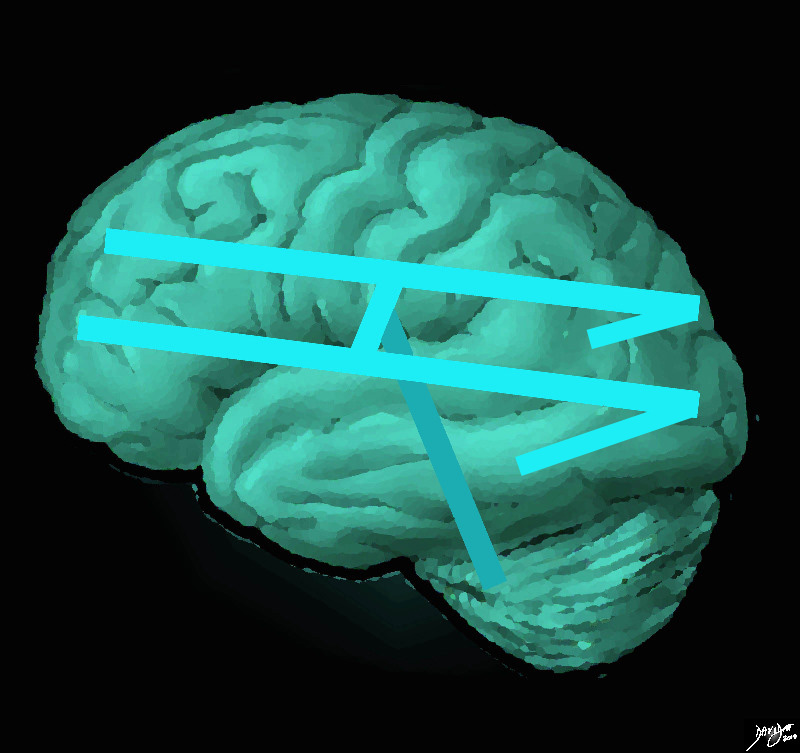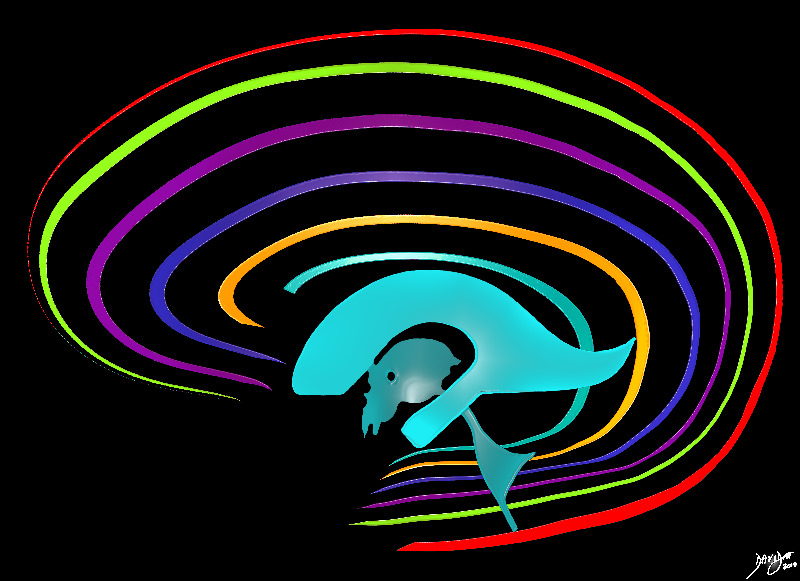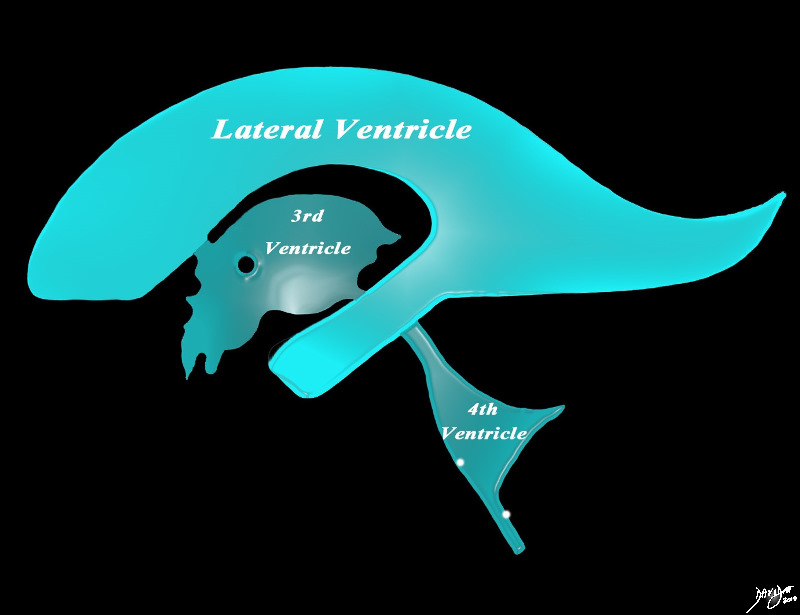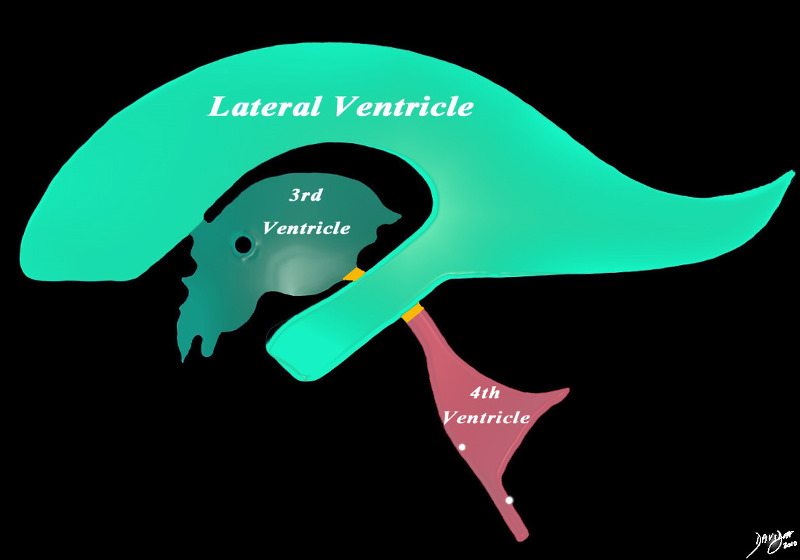Ventricles Sagittal Concepts
Ashley Davidoff MD
The Common Vein Copyright 2010
Introduction
|
The vectors of the ventricular System Overlaid on the Brain |
|
The ventricular system is overlaid on a drawing of the brain. Each limb of the horizontal component is situated in a cerebral hemisphere. The angled parts that extend inferiorly represent the temporal horns. The vertical limb includes the third and fourth ventricles Courtesy Ashley Davidoff MD copyright 2010 all rights reserved 94458e07.81s |
|
The Major Components of the Ventricles |
| The diagram in the sagital projection reveals the horizontal portion called the lateral ventricle. It is a paired structure.The vertical portion (light green consists of the midline 3rd and 4th ventricle.
Courtesy Ashley Davidoff MD copyright 2010 all rights reserved 94459b06b.8s |
|
Detailed Components |
| The diagram in the sagital projection reveals the horizontal portion called the lateral ventricle. It is a paired structure, and houses the frontal horn, body, occipital horn and atrium. The vertical portion consists of the paired foramina of Munro, the midline third ventricle, the narro aqueduct of Sylvius, the 4th ventricle the anteriorly placed paired foramina of Luschka, and theposteriorly positioned foramen
Courtesy Ashley Davidoff MD copyright 2010 all rights reserved 94459b10b02.82s |
|
The Recesses |
| The sagital projection reveals the horizontal portion called the lateral ventricle. It is a paired structure, and houses the frontal horn, body, occipital horn and atrium. The vertical portion consists of the paired foramina of Munro, the midline third ventricle, the narrow aqueduct of Sylvius, the 4th ventricle the anteriorly placed paired foramina of Luschka, and the posteriorly positioned foramen of Magendie There are 4 recesses that create an unusual shape to the third ventricle. Anteriorly the chiasmatic (optic) recesslies above the the infundibular recess. Posteriorly the sprapineal recess lies above the pineal recess.
Courtesy Ashley DAvidoff MD copyright 2010 all rights reserved 94459b14b.82s |
Distribution Bewteen Forebrain Midbrain and Hindbrain
DOMElement Object
(
[schemaTypeInfo] =>
[tagName] => table
[firstElementChild] => (object value omitted)
[lastElementChild] => (object value omitted)
[childElementCount] => 1
[previousElementSibling] => (object value omitted)
[nextElementSibling] =>
[nodeName] => table
[nodeValue] =>
Distribution of the Ventricles
The diagram in the sagital projection reveals the anatomical distribution of the ventriclular components into the forebrain (green), midbrain (orange) and hindbrain (salmon).
Courtesy Ashley DAvidoff MD copyright 2010 all rights reserved 94459b06b01.81s
[nodeType] => 1
[parentNode] => (object value omitted)
[childNodes] => (object value omitted)
[firstChild] => (object value omitted)
[lastChild] => (object value omitted)
[previousSibling] => (object value omitted)
[nextSibling] => (object value omitted)
[attributes] => (object value omitted)
[ownerDocument] => (object value omitted)
[namespaceURI] =>
[prefix] =>
[localName] => table
[baseURI] =>
[textContent] =>
Distribution of the Ventricles
The diagram in the sagital projection reveals the anatomical distribution of the ventriclular components into the forebrain (green), midbrain (orange) and hindbrain (salmon).
Courtesy Ashley DAvidoff MD copyright 2010 all rights reserved 94459b06b01.81s
)
DOMElement Object
(
[schemaTypeInfo] =>
[tagName] => td
[firstElementChild] => (object value omitted)
[lastElementChild] => (object value omitted)
[childElementCount] => 2
[previousElementSibling] =>
[nextElementSibling] =>
[nodeName] => td
[nodeValue] =>
The diagram in the sagital projection reveals the anatomical distribution of the ventriclular components into the forebrain (green), midbrain (orange) and hindbrain (salmon).
Courtesy Ashley DAvidoff MD copyright 2010 all rights reserved 94459b06b01.81s
[nodeType] => 1
[parentNode] => (object value omitted)
[childNodes] => (object value omitted)
[firstChild] => (object value omitted)
[lastChild] => (object value omitted)
[previousSibling] => (object value omitted)
[nextSibling] => (object value omitted)
[attributes] => (object value omitted)
[ownerDocument] => (object value omitted)
[namespaceURI] =>
[prefix] =>
[localName] => td
[baseURI] =>
[textContent] =>
The diagram in the sagital projection reveals the anatomical distribution of the ventriclular components into the forebrain (green), midbrain (orange) and hindbrain (salmon).
Courtesy Ashley DAvidoff MD copyright 2010 all rights reserved 94459b06b01.81s
)
DOMElement Object
(
[schemaTypeInfo] =>
[tagName] => td
[firstElementChild] => (object value omitted)
[lastElementChild] => (object value omitted)
[childElementCount] => 2
[previousElementSibling] =>
[nextElementSibling] =>
[nodeName] => td
[nodeValue] =>
Distribution of the Ventricles
[nodeType] => 1
[parentNode] => (object value omitted)
[childNodes] => (object value omitted)
[firstChild] => (object value omitted)
[lastChild] => (object value omitted)
[previousSibling] => (object value omitted)
[nextSibling] => (object value omitted)
[attributes] => (object value omitted)
[ownerDocument] => (object value omitted)
[namespaceURI] =>
[prefix] =>
[localName] => td
[baseURI] =>
[textContent] =>
Distribution of the Ventricles
)
DOMElement Object
(
[schemaTypeInfo] =>
[tagName] => table
[firstElementChild] => (object value omitted)
[lastElementChild] => (object value omitted)
[childElementCount] => 1
[previousElementSibling] => (object value omitted)
[nextElementSibling] => (object value omitted)
[nodeName] => table
[nodeValue] =>
The Recesses
The sagital projection reveals the horizontal portion called the lateral ventricle. It is a paired structure, and houses the frontal horn, body, occipital horn and atrium. The vertical portion consists of the paired foramina of Munro, the midline third ventricle, the narrow aqueduct of Sylvius, the 4th ventricle the anteriorly placed paired foramina of Luschka, and the posteriorly positioned foramen of Magendie There are 4 recesses that create an unusual shape to the third ventricle. Anteriorly the chiasmatic (optic) recesslies above the the infundibular recess. Posteriorly the sprapineal recess lies above the pineal recess.
Courtesy Ashley DAvidoff MD copyright 2010 all rights reserved 94459b14b.82s
[nodeType] => 1
[parentNode] => (object value omitted)
[childNodes] => (object value omitted)
[firstChild] => (object value omitted)
[lastChild] => (object value omitted)
[previousSibling] => (object value omitted)
[nextSibling] => (object value omitted)
[attributes] => (object value omitted)
[ownerDocument] => (object value omitted)
[namespaceURI] =>
[prefix] =>
[localName] => table
[baseURI] =>
[textContent] =>
The Recesses
The sagital projection reveals the horizontal portion called the lateral ventricle. It is a paired structure, and houses the frontal horn, body, occipital horn and atrium. The vertical portion consists of the paired foramina of Munro, the midline third ventricle, the narrow aqueduct of Sylvius, the 4th ventricle the anteriorly placed paired foramina of Luschka, and the posteriorly positioned foramen of Magendie There are 4 recesses that create an unusual shape to the third ventricle. Anteriorly the chiasmatic (optic) recesslies above the the infundibular recess. Posteriorly the sprapineal recess lies above the pineal recess.
Courtesy Ashley DAvidoff MD copyright 2010 all rights reserved 94459b14b.82s
)
DOMElement Object
(
[schemaTypeInfo] =>
[tagName] => td
[firstElementChild] => (object value omitted)
[lastElementChild] => (object value omitted)
[childElementCount] => 2
[previousElementSibling] =>
[nextElementSibling] =>
[nodeName] => td
[nodeValue] => The sagital projection reveals the horizontal portion called the lateral ventricle. It is a paired structure, and houses the frontal horn, body, occipital horn and atrium. The vertical portion consists of the paired foramina of Munro, the midline third ventricle, the narrow aqueduct of Sylvius, the 4th ventricle the anteriorly placed paired foramina of Luschka, and the posteriorly positioned foramen of Magendie There are 4 recesses that create an unusual shape to the third ventricle. Anteriorly the chiasmatic (optic) recesslies above the the infundibular recess. Posteriorly the sprapineal recess lies above the pineal recess.
Courtesy Ashley DAvidoff MD copyright 2010 all rights reserved 94459b14b.82s
[nodeType] => 1
[parentNode] => (object value omitted)
[childNodes] => (object value omitted)
[firstChild] => (object value omitted)
[lastChild] => (object value omitted)
[previousSibling] => (object value omitted)
[nextSibling] => (object value omitted)
[attributes] => (object value omitted)
[ownerDocument] => (object value omitted)
[namespaceURI] =>
[prefix] =>
[localName] => td
[baseURI] =>
[textContent] => The sagital projection reveals the horizontal portion called the lateral ventricle. It is a paired structure, and houses the frontal horn, body, occipital horn and atrium. The vertical portion consists of the paired foramina of Munro, the midline third ventricle, the narrow aqueduct of Sylvius, the 4th ventricle the anteriorly placed paired foramina of Luschka, and the posteriorly positioned foramen of Magendie There are 4 recesses that create an unusual shape to the third ventricle. Anteriorly the chiasmatic (optic) recesslies above the the infundibular recess. Posteriorly the sprapineal recess lies above the pineal recess.
Courtesy Ashley DAvidoff MD copyright 2010 all rights reserved 94459b14b.82s
)
DOMElement Object
(
[schemaTypeInfo] =>
[tagName] => td
[firstElementChild] => (object value omitted)
[lastElementChild] => (object value omitted)
[childElementCount] => 2
[previousElementSibling] =>
[nextElementSibling] =>
[nodeName] => td
[nodeValue] =>
The Recesses
[nodeType] => 1
[parentNode] => (object value omitted)
[childNodes] => (object value omitted)
[firstChild] => (object value omitted)
[lastChild] => (object value omitted)
[previousSibling] => (object value omitted)
[nextSibling] => (object value omitted)
[attributes] => (object value omitted)
[ownerDocument] => (object value omitted)
[namespaceURI] =>
[prefix] =>
[localName] => td
[baseURI] =>
[textContent] =>
The Recesses
)
DOMElement Object
(
[schemaTypeInfo] =>
[tagName] => table
[firstElementChild] => (object value omitted)
[lastElementChild] => (object value omitted)
[childElementCount] => 1
[previousElementSibling] => (object value omitted)
[nextElementSibling] => (object value omitted)
[nodeName] => table
[nodeValue] =>
Detailed Components
The diagram in the sagital projection reveals the horizontal portion called the lateral ventricle. It is a paired structure, and houses the frontal horn, body, occipital horn and atrium. The vertical portion consists of the paired foramina of Munro, the midline third ventricle, the narro aqueduct of Sylvius, the 4th ventricle the anteriorly placed paired foramina of Luschka, and theposteriorly positioned foramen
Courtesy Ashley Davidoff MD copyright 2010 all rights reserved 94459b10b02.82s
[nodeType] => 1
[parentNode] => (object value omitted)
[childNodes] => (object value omitted)
[firstChild] => (object value omitted)
[lastChild] => (object value omitted)
[previousSibling] => (object value omitted)
[nextSibling] => (object value omitted)
[attributes] => (object value omitted)
[ownerDocument] => (object value omitted)
[namespaceURI] =>
[prefix] =>
[localName] => table
[baseURI] =>
[textContent] =>
Detailed Components
The diagram in the sagital projection reveals the horizontal portion called the lateral ventricle. It is a paired structure, and houses the frontal horn, body, occipital horn and atrium. The vertical portion consists of the paired foramina of Munro, the midline third ventricle, the narro aqueduct of Sylvius, the 4th ventricle the anteriorly placed paired foramina of Luschka, and theposteriorly positioned foramen
Courtesy Ashley Davidoff MD copyright 2010 all rights reserved 94459b10b02.82s
)
DOMElement Object
(
[schemaTypeInfo] =>
[tagName] => td
[firstElementChild] => (object value omitted)
[lastElementChild] => (object value omitted)
[childElementCount] => 2
[previousElementSibling] =>
[nextElementSibling] =>
[nodeName] => td
[nodeValue] => The diagram in the sagital projection reveals the horizontal portion called the lateral ventricle. It is a paired structure, and houses the frontal horn, body, occipital horn and atrium. The vertical portion consists of the paired foramina of Munro, the midline third ventricle, the narro aqueduct of Sylvius, the 4th ventricle the anteriorly placed paired foramina of Luschka, and theposteriorly positioned foramen
Courtesy Ashley Davidoff MD copyright 2010 all rights reserved 94459b10b02.82s
[nodeType] => 1
[parentNode] => (object value omitted)
[childNodes] => (object value omitted)
[firstChild] => (object value omitted)
[lastChild] => (object value omitted)
[previousSibling] => (object value omitted)
[nextSibling] => (object value omitted)
[attributes] => (object value omitted)
[ownerDocument] => (object value omitted)
[namespaceURI] =>
[prefix] =>
[localName] => td
[baseURI] =>
[textContent] => The diagram in the sagital projection reveals the horizontal portion called the lateral ventricle. It is a paired structure, and houses the frontal horn, body, occipital horn and atrium. The vertical portion consists of the paired foramina of Munro, the midline third ventricle, the narro aqueduct of Sylvius, the 4th ventricle the anteriorly placed paired foramina of Luschka, and theposteriorly positioned foramen
Courtesy Ashley Davidoff MD copyright 2010 all rights reserved 94459b10b02.82s
)
DOMElement Object
(
[schemaTypeInfo] =>
[tagName] => td
[firstElementChild] => (object value omitted)
[lastElementChild] => (object value omitted)
[childElementCount] => 2
[previousElementSibling] =>
[nextElementSibling] =>
[nodeName] => td
[nodeValue] =>
Detailed Components
[nodeType] => 1
[parentNode] => (object value omitted)
[childNodes] => (object value omitted)
[firstChild] => (object value omitted)
[lastChild] => (object value omitted)
[previousSibling] => (object value omitted)
[nextSibling] => (object value omitted)
[attributes] => (object value omitted)
[ownerDocument] => (object value omitted)
[namespaceURI] =>
[prefix] =>
[localName] => td
[baseURI] =>
[textContent] =>
Detailed Components
)
DOMElement Object
(
[schemaTypeInfo] =>
[tagName] => table
[firstElementChild] => (object value omitted)
[lastElementChild] => (object value omitted)
[childElementCount] => 1
[previousElementSibling] => (object value omitted)
[nextElementSibling] => (object value omitted)
[nodeName] => table
[nodeValue] =>
The Major Components of the Ventricles
The diagram in the sagital projection reveals the horizontal portion called the lateral ventricle. It is a paired structure.The vertical portion (light green consists of the midline 3rd and 4th ventricle.
Courtesy Ashley Davidoff MD copyright 2010 all rights reserved 94459b06b.8s
[nodeType] => 1
[parentNode] => (object value omitted)
[childNodes] => (object value omitted)
[firstChild] => (object value omitted)
[lastChild] => (object value omitted)
[previousSibling] => (object value omitted)
[nextSibling] => (object value omitted)
[attributes] => (object value omitted)
[ownerDocument] => (object value omitted)
[namespaceURI] =>
[prefix] =>
[localName] => table
[baseURI] =>
[textContent] =>
The Major Components of the Ventricles
The diagram in the sagital projection reveals the horizontal portion called the lateral ventricle. It is a paired structure.The vertical portion (light green consists of the midline 3rd and 4th ventricle.
Courtesy Ashley Davidoff MD copyright 2010 all rights reserved 94459b06b.8s
)
DOMElement Object
(
[schemaTypeInfo] =>
[tagName] => td
[firstElementChild] => (object value omitted)
[lastElementChild] => (object value omitted)
[childElementCount] => 2
[previousElementSibling] =>
[nextElementSibling] =>
[nodeName] => td
[nodeValue] => The diagram in the sagital projection reveals the horizontal portion called the lateral ventricle. It is a paired structure.The vertical portion (light green consists of the midline 3rd and 4th ventricle.
Courtesy Ashley Davidoff MD copyright 2010 all rights reserved 94459b06b.8s
[nodeType] => 1
[parentNode] => (object value omitted)
[childNodes] => (object value omitted)
[firstChild] => (object value omitted)
[lastChild] => (object value omitted)
[previousSibling] => (object value omitted)
[nextSibling] => (object value omitted)
[attributes] => (object value omitted)
[ownerDocument] => (object value omitted)
[namespaceURI] =>
[prefix] =>
[localName] => td
[baseURI] =>
[textContent] => The diagram in the sagital projection reveals the horizontal portion called the lateral ventricle. It is a paired structure.The vertical portion (light green consists of the midline 3rd and 4th ventricle.
Courtesy Ashley Davidoff MD copyright 2010 all rights reserved 94459b06b.8s
)
DOMElement Object
(
[schemaTypeInfo] =>
[tagName] => td
[firstElementChild] => (object value omitted)
[lastElementChild] => (object value omitted)
[childElementCount] => 2
[previousElementSibling] =>
[nextElementSibling] =>
[nodeName] => td
[nodeValue] =>
The Major Components of the Ventricles
[nodeType] => 1
[parentNode] => (object value omitted)
[childNodes] => (object value omitted)
[firstChild] => (object value omitted)
[lastChild] => (object value omitted)
[previousSibling] => (object value omitted)
[nextSibling] => (object value omitted)
[attributes] => (object value omitted)
[ownerDocument] => (object value omitted)
[namespaceURI] =>
[prefix] =>
[localName] => td
[baseURI] =>
[textContent] =>
The Major Components of the Ventricles
)
DOMElement Object
(
[schemaTypeInfo] =>
[tagName] => table
[firstElementChild] => (object value omitted)
[lastElementChild] => (object value omitted)
[childElementCount] => 1
[previousElementSibling] => (object value omitted)
[nextElementSibling] => (object value omitted)
[nodeName] => table
[nodeValue] =>
The Deepest Layers of the Inverted C’s
In the diagram that describes the series of inverted “C” the ventricles are the deepest and most midline of the structures In this diagram it is demonstrated as the innermost teal bluue ring. The frontal horns are superior and anterior and the temporal horns are the most inferior and anterior.
Courtesy Ashley Davidoff MD copyright 2010 all rights reserved 93890b01b05b1.8s
[nodeType] => 1
[parentNode] => (object value omitted)
[childNodes] => (object value omitted)
[firstChild] => (object value omitted)
[lastChild] => (object value omitted)
[previousSibling] => (object value omitted)
[nextSibling] => (object value omitted)
[attributes] => (object value omitted)
[ownerDocument] => (object value omitted)
[namespaceURI] =>
[prefix] =>
[localName] => table
[baseURI] =>
[textContent] =>
The Deepest Layers of the Inverted C’s
In the diagram that describes the series of inverted “C” the ventricles are the deepest and most midline of the structures In this diagram it is demonstrated as the innermost teal bluue ring. The frontal horns are superior and anterior and the temporal horns are the most inferior and anterior.
Courtesy Ashley Davidoff MD copyright 2010 all rights reserved 93890b01b05b1.8s
)
DOMElement Object
(
[schemaTypeInfo] =>
[tagName] => td
[firstElementChild] => (object value omitted)
[lastElementChild] => (object value omitted)
[childElementCount] => 2
[previousElementSibling] =>
[nextElementSibling] =>
[nodeName] => td
[nodeValue] =>
In the diagram that describes the series of inverted “C” the ventricles are the deepest and most midline of the structures In this diagram it is demonstrated as the innermost teal bluue ring. The frontal horns are superior and anterior and the temporal horns are the most inferior and anterior.
Courtesy Ashley Davidoff MD copyright 2010 all rights reserved 93890b01b05b1.8s
[nodeType] => 1
[parentNode] => (object value omitted)
[childNodes] => (object value omitted)
[firstChild] => (object value omitted)
[lastChild] => (object value omitted)
[previousSibling] => (object value omitted)
[nextSibling] => (object value omitted)
[attributes] => (object value omitted)
[ownerDocument] => (object value omitted)
[namespaceURI] =>
[prefix] =>
[localName] => td
[baseURI] =>
[textContent] =>
In the diagram that describes the series of inverted “C” the ventricles are the deepest and most midline of the structures In this diagram it is demonstrated as the innermost teal bluue ring. The frontal horns are superior and anterior and the temporal horns are the most inferior and anterior.
Courtesy Ashley Davidoff MD copyright 2010 all rights reserved 93890b01b05b1.8s
)
DOMElement Object
(
[schemaTypeInfo] =>
[tagName] => td
[firstElementChild] => (object value omitted)
[lastElementChild] => (object value omitted)
[childElementCount] => 2
[previousElementSibling] =>
[nextElementSibling] =>
[nodeName] => td
[nodeValue] =>
The Deepest Layers of the Inverted C’s
[nodeType] => 1
[parentNode] => (object value omitted)
[childNodes] => (object value omitted)
[firstChild] => (object value omitted)
[lastChild] => (object value omitted)
[previousSibling] => (object value omitted)
[nextSibling] => (object value omitted)
[attributes] => (object value omitted)
[ownerDocument] => (object value omitted)
[namespaceURI] =>
[prefix] =>
[localName] => td
[baseURI] =>
[textContent] =>
The Deepest Layers of the Inverted C’s
)
DOMElement Object
(
[schemaTypeInfo] =>
[tagName] => table
[firstElementChild] => (object value omitted)
[lastElementChild] => (object value omitted)
[childElementCount] => 1
[previousElementSibling] => (object value omitted)
[nextElementSibling] => (object value omitted)
[nodeName] => table
[nodeValue] =>
The vectors of the ventricular System Overlaid on the Brain
The ventricular system is overlaid on a drawing of the brain. Each limb of the horizontal component is situated in a cerebral hemisphere. The angled parts that extend inferiorly represent the temporal horns. The vertical limb includes the third and fourth ventricles
Courtesy Ashley Davidoff MD copyright 2010 all rights reserved 94458e07.81s
[nodeType] => 1
[parentNode] => (object value omitted)
[childNodes] => (object value omitted)
[firstChild] => (object value omitted)
[lastChild] => (object value omitted)
[previousSibling] => (object value omitted)
[nextSibling] => (object value omitted)
[attributes] => (object value omitted)
[ownerDocument] => (object value omitted)
[namespaceURI] =>
[prefix] =>
[localName] => table
[baseURI] =>
[textContent] =>
The vectors of the ventricular System Overlaid on the Brain
The ventricular system is overlaid on a drawing of the brain. Each limb of the horizontal component is situated in a cerebral hemisphere. The angled parts that extend inferiorly represent the temporal horns. The vertical limb includes the third and fourth ventricles
Courtesy Ashley Davidoff MD copyright 2010 all rights reserved 94458e07.81s
)
DOMElement Object
(
[schemaTypeInfo] =>
[tagName] => td
[firstElementChild] => (object value omitted)
[lastElementChild] => (object value omitted)
[childElementCount] => 2
[previousElementSibling] =>
[nextElementSibling] =>
[nodeName] => td
[nodeValue] =>
The ventricular system is overlaid on a drawing of the brain. Each limb of the horizontal component is situated in a cerebral hemisphere. The angled parts that extend inferiorly represent the temporal horns. The vertical limb includes the third and fourth ventricles
Courtesy Ashley Davidoff MD copyright 2010 all rights reserved 94458e07.81s
[nodeType] => 1
[parentNode] => (object value omitted)
[childNodes] => (object value omitted)
[firstChild] => (object value omitted)
[lastChild] => (object value omitted)
[previousSibling] => (object value omitted)
[nextSibling] => (object value omitted)
[attributes] => (object value omitted)
[ownerDocument] => (object value omitted)
[namespaceURI] =>
[prefix] =>
[localName] => td
[baseURI] =>
[textContent] =>
The ventricular system is overlaid on a drawing of the brain. Each limb of the horizontal component is situated in a cerebral hemisphere. The angled parts that extend inferiorly represent the temporal horns. The vertical limb includes the third and fourth ventricles
Courtesy Ashley Davidoff MD copyright 2010 all rights reserved 94458e07.81s
)
DOMElement Object
(
[schemaTypeInfo] =>
[tagName] => td
[firstElementChild] => (object value omitted)
[lastElementChild] => (object value omitted)
[childElementCount] => 2
[previousElementSibling] =>
[nextElementSibling] =>
[nodeName] => td
[nodeValue] =>
The vectors of the ventricular System Overlaid on the Brain
[nodeType] => 1
[parentNode] => (object value omitted)
[childNodes] => (object value omitted)
[firstChild] => (object value omitted)
[lastChild] => (object value omitted)
[previousSibling] => (object value omitted)
[nextSibling] => (object value omitted)
[attributes] => (object value omitted)
[ownerDocument] => (object value omitted)
[namespaceURI] =>
[prefix] =>
[localName] => td
[baseURI] =>
[textContent] =>
The vectors of the ventricular System Overlaid on the Brain
)






